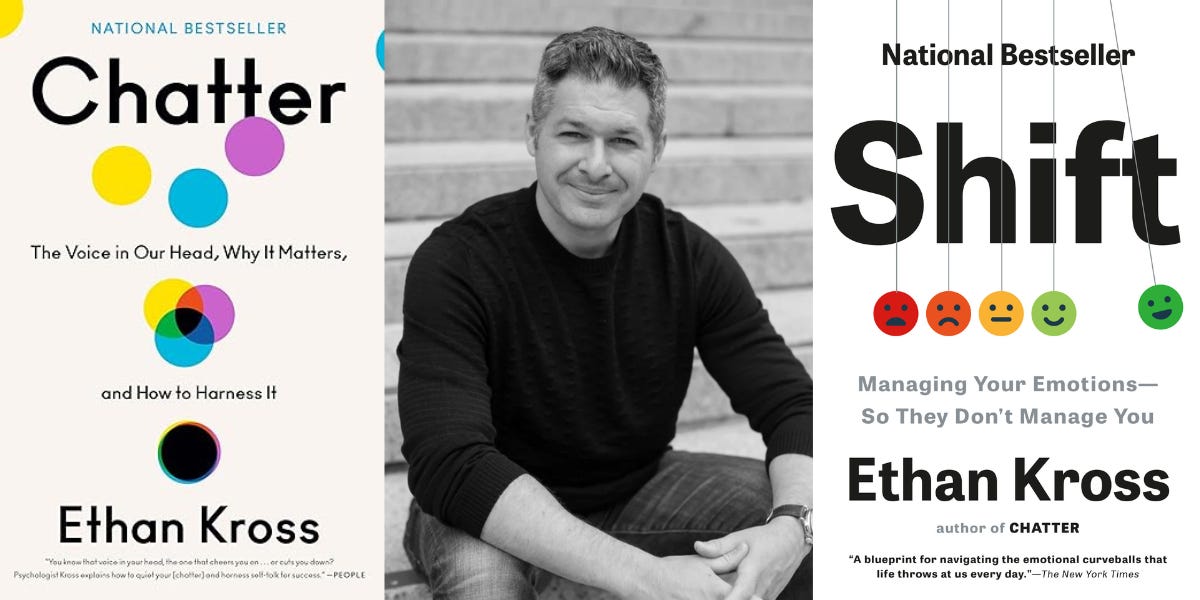Ethan Kross on Writing, Emotions, and the Science of Self-Control
21 Questions with the bestselling psychologist about life outside the lab.
If you’ve ever been stuck in a spiral of overthinking—the kind where your inner voice won’t stop running circles around you—you’ll want to meet psychologist Ethan Kross.
As one of the world’s leading experts on how our minds can both help and hinder us, he has built his career studying the way we talk to ourselves—what psychologists call “inner speech”—and how we can channel it to reduce stress, sharpen decisions, and strengthen relationships.
Ethan is the founder of the Emotion & Self-Control Laboratory at the University of Michigan, where he’s a professor in both the Psychology Department and the Ross School of Business. His research has appeared in Science and The New England Journal of Medicine, and he’s been featured on Good Morning America, NPR, and CBS Evening News. In short: if your brain is driving you a little nuts, he’s the guy who can explain why, as well as what you can do about it.
He’s also the author of two national bestsellers: Shift: Managing Your Emotions—So They Don’t Manage You and Chatter: The Voice in Our Head, Why It Matters, and How to Harness It (which was also a Next Big Idea Club official selection).
In this round of 21 Questions, Ethan shares the rituals that keep him grounded, the worst advice he’s ever gotten, and why he’s finally ready to experiment with AI. He also gives us a glimpse of his next book, which explores what emotions are and how we can manage them using simple, science-based tools already at our disposal.
—Panio
21 Questions for Ethan Kross
1. I couldn’t have written my last book without… my tea kettle. I always have a cup of English breakfast tea (a splash of milk, one lump of sugar) next to my keyboard when I’m writing. This habit has gotten me into trouble—more than one laptop has short-circuited after a spill. But what can I say? I love my tea!
2. Do you read your reviews? Yes, I read all the major reviews for better or worse.
3. Kiss, marry, kill: podcasts, newsletters, and speaking gigs.
Kiss: speaking gigs.
Marry: podcasts.
Kill: newsletters
4. What keeps you up at night? It depends. Most nights, I sleep well, but every few weeks I wake up with work on my mind—anything from a tricky relationship issue to worrying about a chapter or paper I’m working on. Occasionally, it's something so random or outlandish that I laugh about it in the morning.
5. Have any tech tools made your job easier? Online search engines like Google Scholar changed the game. When I first started research, I’d have to go to the library, hunt down journals, and make photocopies. Now, I can find, download, and annotate articles in minutes. Tools like Papers (think iTunes for PDFs) and reference management software have become invaluable.
6. What new tools or distribution channels do you want to try? I’m eager to start using AI tools in my workflow. Until now, I’ve taken a wait-and-see approach, but it’s clear that embracing these tools for some tasks is going to be necessary.
7. How has AI changed your writing process? It hasn’t—yet!
8. Where do you find new ideas? Everywhere. Starting a new project feels like putting on tinted glasses—I see the world through the lens of what I'm writing. Conversations, articles, shows, podcasts; everything gets filtered as possible material.
9. How do you keep track of new ideas? The Notes app on my laptop. It’s simple, but it works!
10. What’s the best piece of professional advice you’ve ever received? When I stated my job at Michigan I had so many things I wanted to accomplish. A senior colleague told me he wakes up each day and asks himself which project has the best chance to make the biggest impact, then focuses on that. I think about that advice often when deciding where to put my energy.
11. And the worst? “Wait until you retire to write a book.”
12. Foreign rights, audio rights, film rights: which have been the most valuable to you? Foreign rights.
13. How did you find your agent? He reached out to me, right as I was thinking about starting a book. We hit it off right away!
14. Coffee, tea, or something stronger? Tea — three to five cups a day! Coffee before speaking gigs and at the airport, and rarely otherwise.
15. How many drafts before you show your editor? As many as it takes for me to be proud of the chapter—usually in the teens.
16. Can you describe your ideal workday? Wake up around 6 am, make tea, and write or research for a few hours. Then I exercise with a friend, shower, have breakfast, and head downtown to my office or a coffeeshop for meetings and more writing. Afterward, I walk home and cook dinner for my family to unwind. A walk after dinner, more time with my wife and kids, then a bath and bed.
17. How does that compare to your actual workday? If I’m not traveling, it’s pretty close! The biggest difference is I can’t always make or eat dinner with my family since everyone is so busy. But I’m militant about sticking to my morning tea and bathing rituals (no judgment, please)!
18. What is your new book about? Emotions. What they are, and how people can manage them using science-based tools they already have: within themselves, in their relationships, and in their environments.
19. How are you using social media to grow your audience? Not very well! I post when new media or exciting news comes out, but not nearly as often as I should. I’m working on it.
20. What is the one piece of advice you would give to recent graduates that want to make a living as a writer? If you love writing, do it! But be realistic. It takes time, and you’ll likely need other income streams at first.
21. Fill in the blank: In five years, successful authors will all be… as wonderfully varied in background, style, and approach as they are today.
✨ Thanks to Ethan for joining us at Author Insider! You can learn more about his work (and keep an eye out for his next book on emotions) at ethankross.com.
We’ve all wrestled with our inner chatter. What’s one strategy, habit, or ritual that helps you quiet your mind—or turn that voice into something useful? Share it in the comments and join the conversation.





Great interview guys! PS: One good question to ask authors in the future is, "What's 1 marketing tip you'd give a new author?"
One strategy to quiet my mind? Double inhale with extra-long exhale through the nose. (Drawn from my teacher, Jill Miller’s book: Body by Breath.